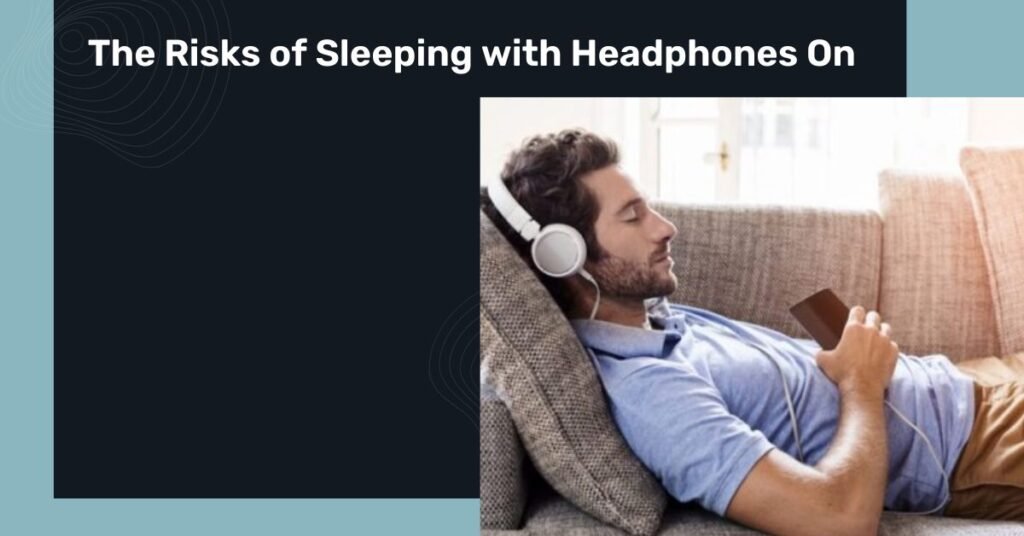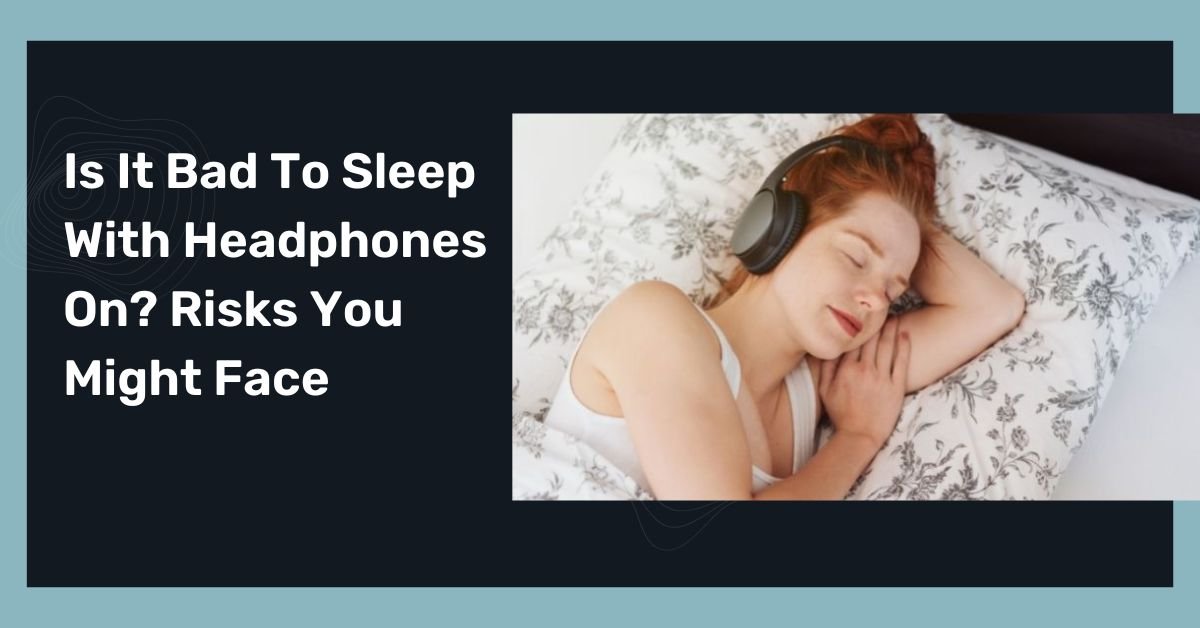The use of headphones has become increasingly popular over the years, whether it’s for listening to music, watching videos, or even making calls. It’s not uncommon for people to fall asleep while still wearing their headphones, but is it bad to sleep with headphones on? In this article, we will explore the risks you might face by sleeping with headphones on.
Sleeping with headphones on is becoming increasingly popular among people of all ages. Many individuals believe that listening to music or calming sounds can help them fall asleep faster and stay asleep longer. However, wearing headphones while sleeping may pose certain risks and dangers that could harm your health and well-being.
The Risks of Sleeping with Headphones On
Damage to Your Ears
The first and most obvious risk of sleeping with headphones on is the potential damage to your ears. When you listen to music or any other sound through headphones, the sound waves travel directly into your ears, which can cause damage over time. This can lead to a condition called tinnitus, which is a ringing or buzzing sound in the ears. In extreme cases, it can even lead to permanent hearing loss.
Why Sleeping with Headphones Can Be Dangerous
The main risk associated with sleeping with headphones on is the potential damage to your ears. If you use in-ear headphones, the earbuds can block the ear canal and trap moisture, creating a breeding ground for bacteria and leading to ear infections. In addition, having anything in your ear for extended periods can cause earwax buildup or even damage the delicate structures inside your ear.
Even if you use over-the-ear headphones, which don’t go inside your ear canal, you can still be at risk of hearing damage if you listen to music or other sounds at high volumes for extended periods. According to the World Health Organization (WHO), listening to music at volumes above 85 decibels (dB) for prolonged periods can lead to hearing loss and other hearing problems.
Another potential risk of sleeping with headphones on is the increased risk of accidents. When you wear headphones, you may not hear important sounds around you, such as your alarm clock, smoke detector, or someone calling your name. This can put you in danger and increase the risk of accidents, especially if you need to react quickly to a situation.
Safer Alternatives to Sleeping with Headphones On
If you must listen to music or other sounds to fall asleep, there are safer alternatives to sleeping with headphones on. For example, you can try using a white noise machine, which generates a constant, soothing sound that can help mask background noise and promote relaxation. You can also try using a sleep app that offers a range of sounds and music designed specifically for sleep.
If you prefer to listen to your own music or sounds, you can try using a speaker pillow, which is a pillow with built-in speakers that allow you to listen to music or other sounds without having anything in or on your ears. Alternatively, you can use a regular speaker and place it on your bedside table, making sure to keep the volume low.
Strangulation
Another risk associated with sleeping with headphones on is the potential for strangulation. If the headphones’ cord gets wrapped around your neck, it can create a strangulation hazard, especially if the cord is long or tangled. This risk is higher for children or pets that may accidentally get caught in the cord.
To reduce the risk of strangulation, make sure the cord is short and untangled, and avoid sleeping in positions where the cord can wrap around your neck. It’s also important to keep headphones and cords out of reach of children and pets when not in use.
Sleep Disruptions
While some people find that listening to music or calming sounds can help them fall asleep faster and stay asleep longer, others may experience sleep disruptions. If you use headphones to fall asleep, you may become dependent on them, making it difficult to sleep without them. Also, if the music or sounds you listen to are too stimulating, they could keep you awake, leading to sleep deprivation and other health problems.
Discomfort and Pain
Sleeping with headphones on can also cause discomfort and pain. Wearing headphones for an extended period, especially while lying down, can put pressure on your ears and the surrounding areas, causing pain, soreness, or even headaches.
In addition, wearing headphones while sleeping can cause discomfort and pain in other areas of your body, such as your neck, shoulders, and jaw. This is because headphones can interfere with your natural sleeping position and cause you to strain your muscles or joints.
To prevent discomfort and pain, it’s important to take breaks from wearing headphones, especially during long listening sessions. You should also try to find headphones that are comfortable and don’t put too much pressure on your ears or head. Finally, if you do experience discomfort or pain, take a break from wearing headphones and see a doctor if necessary.
Increased Risk of Infections
Sleeping with headphones on can also increase the risk of ear infections. Wearing headphones for an extended period can trap moisture in your ears, creating a warm and moist environment that is perfect for bacteria to grow. This can lead to infections such as a swimmer’s ear or fungal infections.
To reduce the risk of infections, it’s important to keep your ears clean and dry. You should also take breaks from wearing headphones and avoid sharing headphones with others. If you do develop an ear infection, see a doctor and avoid wearing headphones until the infection has cleared up.
Decreased Sleep Quality
Another potential risk of sleeping with headphones on is decreased sleep quality. Even if you’re listening to soothing music or white noise, wearing headphones can disrupt your natural sleep patterns and prevent you from entering deep sleep.
In addition, headphones can be uncomfortable and cause you to toss and turn, leading to further disruptions in your sleep. This can lead to feelings of fatigue, irritability, and difficulty concentrating during the day.
To improve your sleep quality, it’s important to create a sleep-conducive environment that is free from distractions such as noise or light. You should also avoid using electronic devices before bed, including headphones, and establish a relaxing bedtime routine to help you unwind.

Precautions to Take
If you’re considering sleeping with headphones on, it’s essential to take some precautions to reduce the risks involved. Here are some tips to keep in mind:
Use Over-the-Ear Headphones
Over-the-ear headphones are generally safer than in-ear headphones since they don’t go inside your ear canal. Additionally, they’re more comfortable to wear for an extended period, reducing the risk of pressure sores or ear canal irritation.
Keep the Volume Low
It’s essential to keep the volume low when listening to music or other sounds with headphones on, especially if you’re using in-ear headphones. The recommended volume limit is 60% of the maximum volume for no more than 60 minutes per day.
Clean Your Headphones Regularly
If you’re using in-ear headphones, it’s essential to clean them regularly to prevent ear infections. Use a soft, damp cloth to wipe them down, and avoid sharing them with others.
Don’t Sleep with Headphones on Every Night
It’s essential to give your ears a break from headphones regularly. Try not to sleep with headphones on every night and use them only when necessary.
Conclusion
In conclusion, sleeping with headphones on can be risky and potentially harmful to your health. While some individuals may find it helps them fall asleep faster or stay asleep longer, it’s important to consider the potential risks and take precautions to reduce them. If you must use headphones to fall asleep, use over-the-ear headphones, keep the volume low, clean your headphones regularly, and avoid using them every night.
Frequently Asked Questions
Q. Is it bad to sleep with headphones on every night?
A. Yes, sleeping with headphones on every night can be harmful to your hearing and increase the risk of accidents and other health problems.
Q. What types of headphones are safest to use while sleeping?
A. Over-the-ear headphones are generally safer than in-ear headphones since they don’t go inside your ear canal.
Q. Can sleep with headphones on lead to permanent hearing loss?
A. Yes, listening to music or other sounds at high volumes for extended periods can lead to permanent hearing loss.
Q. What should I do if I experience discomfort or pain while wearing headphones?
A. If you experience discomfort or pain while wearing headphones take a break and remove them for a while. If the pain persists, see a doctor.
Q. How can I reduce the risk of accidents while sleeping with headphones on?
A. To reduce the risk of accidents while sleeping with headphones on, keep the volume low, use over-the-ear headphones, and avoid sleeping with headphones on every night.

